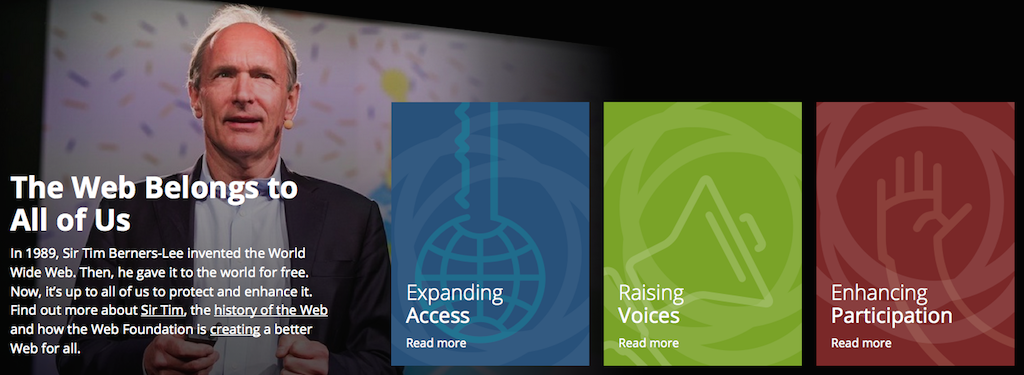 Sir Tim Berners-Lee founded the World Wide Web Foundation in 2009 with the mission to establish the open Web as a basic right and a public good. The Foundation is intent on “building a future in which the Web empowers everyone, everywhere, to take part in building a fairer world.”
Sir Tim Berners-Lee founded the World Wide Web Foundation in 2009 with the mission to establish the open Web as a basic right and a public good. The Foundation is intent on “building a future in which the Web empowers everyone, everywhere, to take part in building a fairer world.”
 As described on its new website (launched 26th May 2015), the Foundation has three over-arching programmes:
As described on its new website (launched 26th May 2015), the Foundation has three over-arching programmes:
- Expanding Access
- Raising Voices
- Enhancing Participation
I’ll introduce each briefly, and then identify how we aspire to play our part.
Expanding Access
– Ensuring everyone can access all of the Internet, all of the time.
The Foundation leads the Alliance for Affordable Internet, a multi-stakeholder coalition pushing for policy reforms that will make fast, reliable Internet affordable and accessible to all. (Not to be confused with the repugnant zero-rating price discrimination exemplified by Facebook’s Internet.org project.)
Raising Voices
– Fighting for your rights to freedom of expression and privacy online.
The Web gives voice to billions, levelling the playing field and allowing ordinary people to speak truth to power. But through increasing censorship and surveillance, some governments are taking these freedoms away from us. Some companies are abusing our personal data, or trying to build “fast lanes” for their favoured content. Unchecked harassment has a chilling effect on women’s rights online. We make our voice heard on the most important issues – and connect and amplify local campaigns for laws that will keep the Web open, free, and secure for all of us.
This programme includes three projects: Web We Want, Women’s Rights Online, and the Web Index.
Enhancing Participation
– Democratising the world’s information through open data.
In a well-functioning democratic society, citizens need to know what government is doing. Yet, our research shows that only 8% of countries provide unfettered online access to vital datasets on public spending, procurement, and the performance of health and education services. We want everyone to be able to access, understand, and use data to change their society for the better.
Corresponding projects include the Open Data Working Group of the Open Government Partnership, and the Open Data Research Network.
Inspired and aspiring
The hi:project is inspired by the World Wide Web Foundation’s mission, and we aspire to do our bit.
We believe the hi:project builds trust and aligns the motivations of the individual and of organizations – corporate, government, charity and civil society. All the more reason for it to succeed. Only those entities deriving value from a centralizing dynamic will have that to lose here.
In terms of expanding access, we might not impact affordability, but accessibility is central to our architecture. In fact, we’d love the opportunity to help develop a Foundation project, say an Alliance for Accessible Internet, an open community intent on building the open components required by HI.
When it comes to raising voices, the hi:project helps solve privacy by giving citizens domain over their personal data (see “epitome of VRM” and We The Data grand challenges), and rises up to regulatory challenges such as the GDPR.
Our technical plan is wholly compatible with the EFF’s determination to “create a global movement that encourages user-side encryption.” We champion coveillance and socioveillance in preference to surveillance and sousveillance.
And our focus on privacy facilitates openness, enhancing participation by helping citizens pool data to hold governments and other organizations to account.
[Image source: Screenshot of the World Wide Web Foundation homepage, 2nd July 2015, CC BY 4.0 International. Includes an image by Bret Hartman/TED, CC BY NC 3.0.]